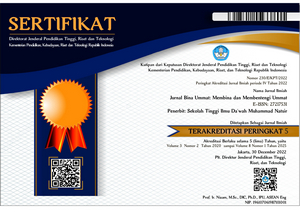a RAJA ALI HAJI'S POLITICAL THOUGHTS
RAJA ALI HAJI'S POLITICAL THOUGHTS
DOI:
https://doi.org/10.38214/jurnaldawahstidnatsir.v6i1.168Keywords:
Ethical Pattern, Legal Style, Shari'at-based royal systemAbstract
Raja Ali Haji was a Malay aristocrat of Bugis descent. A scholar, poet as well as the most prominent and respected statesman in the Riau-Lingga Kingdom who centered on Penyengat Island in the late 19th century. This research was arranged by method qualitative through a historical approach that uses data collection instruments literature review (library research). The data in this study were taken from the works of Raja Ali Haji which has a theme focus on political thought. The findings show The ideal political system for the Malay world in the view of Raja Ali Haji is a royal system based on Islamic law (theo-monarchy). His activities as a political practitioner as well the maturity of the intellectual tradition through its interaction with the classical texts of Al-Ghazâli, Al-Mawardi, and other scholars provide an ethical pattern, namely a pattern that gives emphasis on the ethics of power holders. But, at the same time a thought Raja Ali Haji's politics is also included in the legal style category because he puts forward theories that focus on the theory of the legitimacy of the ruler from the point of view of Islamic law.
Published
Versions
- 2025-01-08 (4)
- 2023-06-13 (3)
- 2023-08-02 (2)
- 2023-06-13 (2)
- 2023-06-13 (1)
How to Cite
Issue
Section
Copyright (c) 2023 Jurnal Da'wah: Risalah Merintis, Da'wah Melanjutkan

This work is licensed under a Creative Commons Attribution 4.0 International License.
This work is licensed under a Lisensi Creative Commons Atribusi 4.0 Internasional.
Authors who publish with this journal agree to the following terms:
- Authors retain copyright and grant the journal right of first publication with the work simultaneously licensed under a Creative Commons Attribution License that allows others to share the work with an acknowledgment of the work's authorship and initial publication in this journal.
- Authors are able to enter into separate, additional contractual arrangements for the non-exclusive distribution of the journal's published version of the work (e.g., post it to an institutional repository or publish it in a book), with an acknowledgment of its initial publication in this journal.
- Authors are permitted and encouraged to post their work online (e.g., in institutional repositories or on their website) prior to and during the submission process, as it can lead to productive exchanges, as well as earlier and greater citation of published work (See The Effect of Open Access).




